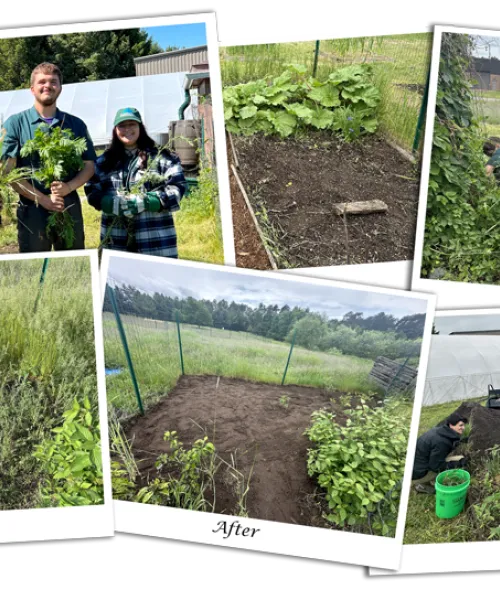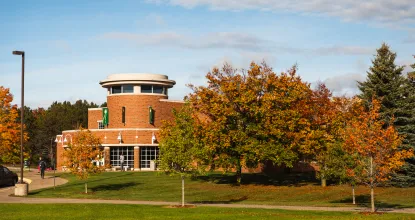
As a program manager at the Superior Watershed Partnership (SWP), NMU alumnus Tyler Penrod ('20 BS) facilitated the removal of invasive plant species from the grounds of the NMU Hoop House. In early June 2024, Great Lakes Tribal Conservation Corps (GLTCC) crew leader Olivia (Liv) Gordon and members Sam, Turner, and Kyle pulled up spotted knapweed, tansy, and non-native grasses that had taken hold around the outdoor garden beds. The group then spread seeds of native wildflowers and grasses to cover bare ground and keep the aggressive non-native plants from reestablishing.
The overarching goal of the two-day effort was to revitalize an existing pollinator garden and give a new bed of native flowering plants the best possible chance to provide colorful, nectar-rich blossoms for bees, butterflies, and other pollinating insects and birds. This restored habitat will also benefit residents of the beehives that NMU’s Apiculture Club relocated to the area near the Hoop House. Hopefully the flowers of the chives, squash, cucumbers, strawberries, blueberries, and tomatoes will be another great source of nectar in exchange for pollination leading to a wholesome harvest.
Liv ('23 BS, Outdoor Recreation & Leadership Management) was a member of this same GLTCC crew last summer that spent several weeks collaborating with the Keweenaw Bay Indian Community Natural Resources Department (KBIC NRD). Liv said that a highlight from that season was that the crew was invited to participate in KBIC’s water walk on Lake Superior Day, which helped her understand how sacred and deeply respected the lake and land are. Liv’s coursework in NMU’s Center for Native American Studies (CNAS) had introduced her to a deeper level of respect for the environment than she had known. This year Liv returned as the crew leader of the GLTCC. Liv explained, “I feel blessed to learn traditional knowledge from the tribal community and to see that our crew’s efforts are appreciated. I am really drawn to this type of conservation.”
Sam Zwiefelhofer is a Fisheries and Wildlife Management major at NMU. He heard about the GLCC from friends and was excited about the idea of staying in Marquette for the summer, meeting new people, and making connections. Sam commented that, “Being involved in different communities around the U.P. has helped me gain so much perspective.” He is looking forward to applying what he learned in NAS courses to the projects with the KBIC NRD.
Turner Ross is a Fisheries and Wildlife Management major with a minor in Native American Studies. He also is the secretary of the Native American Student Association at NMU. He hopes that his GLCC experience with this crew will serve as a stepping stone toward working with Tribal government in Wisconsin or Michigan. He likes getting up early, being outside, working on different types of projects including trail maintenance and removing abandoned tires, and pursuing a job that benefits the community and the environment.
Kyle graduated from a local high school this spring and is thrilled to have a crew member position with the GLTCC this summer. It helps affirm his goals of attending NMU and pursuing a career in conservation. He loves the outdoors and enjoys mountain biking on our local trails.
The efforts of these four crew members at the NMU Hoop House benefited the health of the ecosystem—including the plants and the bees. The Hoop House grounds visually are now more appealing for community members who bring their food scraps to compost in the outdoor bins, walk or bike past the Jacobetti Complex, or volunteer to water or weed or (later in the summer) harvest from the garden beds. Special thanks to the Superior Watershed Partnership and these four enthusiastic crew members for making a difference in the community. It’s wonderful to have such great people and environmental stewards in the U.P.
